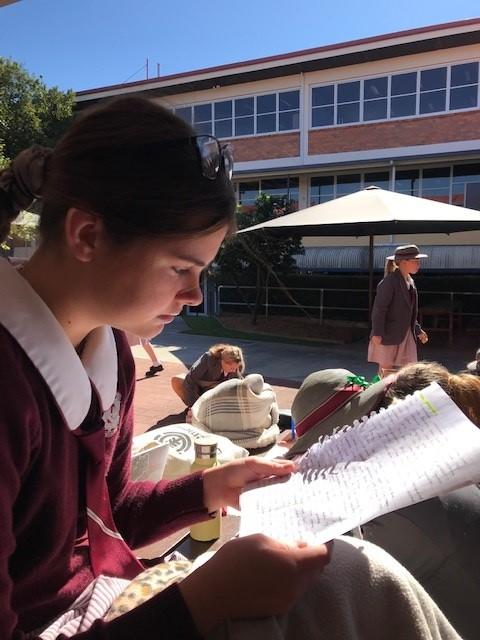Year 12 Pastoral Guardian

Promoting Positive Pathways
Your daughters may be feeling the pressure of assessments. Stress is your daughters' response to pressure and, while a small amount of pressure can be helpful to keep them focused during an examination, it may well impede their study if it becomes too much.
Exam pressure is normal and very common. Students might experience it because:
- they are worried about how well they will do in the exam;
- they feel unprepared or haven’t had time to study;
- there is an element of uncertainty;
- they are focusing too far ahead;
- they might place pressure on themselves because of perceived expectations;
- they may be experiencing stress in another part of their life. (qld.gov.au,2021).
It is important to remind them that this is only a tiny part of their life, even though it might not feel like it at this time in the assessment cycle. It is essential to normalise the small part and role healthy pressure plays in the assessment phase of the academic cycle.
Do you notice your daughters:
- losing touch with friends and the activities they enjoy;
- feeling moody, low, or overwhelmed;
- having trouble making decisions;
- losing their appetite or overeating;
- sleeping poorly and struggling to get out of bed;
- difficulty being motivated to start studying;
- experiencing tense muscles or headaches
- having clammy hands or feeling butterflies in her stomach
- experiencing a racing heartbeat or feeling sick
- fidgeting, nail-biting, or teeth grinding
- feeling confused, or having their mind going blank during exams? (qld.gov.au,2021)
These symptoms can interfere with how much they enjoy life, especially around examination times.
Please encourage them to:
- Go to bed at a reasonable time, eat regularly, and make time to have fun and exercise.
- Cut back on energy drinks, coffee, or any other stimulants as these can make you feel agitated; drink water instead.
- To eat and relax - do something they enjoy rather than carrying on with work.
- Avoid junk food – while junk food provides a sudden burst of energy, it quickly disappears. Eat well.
- Reward them when they achieve their study goals, such as watching an episode of a favourite TV show or going for a run.
- Allow them time to rest.
- Stay focused on their study; try not to be distracted.
- The personal and social capabilities are a continuum around the whole college to hopefully have developed strategies for self- social awareness and social and self-management. This continuum is developed by a purposeful well-designed Personal Development Program. (qld.gov.au,2021)
Interestingly, the theme for this term in the Personal Development Program is Healthy Relationships. While developing their personal and social capacities through pedagogy, hopefully your daughter has developed a greater sense of self and social awareness and social and self-management. Your daughter has discussed healthy vs unhealthy relationships in the program and closely examined the recent global concerns facing women. The program focused on how young people are holding and handling their connections and themselves - specifically, looking at their relationships and issues around consent and sexual intimacy; and exploring how the media portrays gender. In classrooms, a mixture of clips and stories fuelled spirited discussion, making lessons interactive and enjoyable.
Perfectly timed, the program revisited stress - particularly not relying on others but themselves to manage their stress with the competing demands of Year 12, taking charge of self-talk, and not freaking out.
We have been encouraging the students to explore their emotional state and the influence of self-talk, and the benefit of positive self-talk to promote positive and wanted outcomes. Each student identified what they can change in their self-talk and how this may help them. If stuck, students were prompted to discuss and understand gratitude to encourage positive thinking and positive self-talk. Aptly, the program focused on individual emotional states in preparation for the assessments and exams ahead. More importantly, lessons were designed for students to be conscious and aware of decisions that will help support and prepare emotionally, physically, and psychologically for the future.
Remember, encourage your daughters to take time out to relax a bit before Term 3 begins. Make sure they do something they enjoy and keep connected.
Bridget Piper
Support
ReachOut
- Coping strategies for exam stress: Amy, Philip, Calypso, and Christo share their study stress stories and share what they did to cope throughout exams.
- If you’re feeling stressed, here are some simple swaps you can make to help you deal with it.
- 5 steps to study success.
- Friendship and exam stress: Five tips to keep things positive.
Youth beyondblue
- Phone 1300 224 636 (24 hours, 7 days).
- Chat online (from 3.00pm to 12.00 midnight, 7 days).
headspace
To help reduce stress and ensure you’re as organised as you can be, learn more about planning, looking after yourself, and staying focused for your exams.
- headspace has centres located throughout Australia, staffed with people who are trained and ready to help. Find a centre.
- If there isn’t a headspace near you, you can access online chat and telephone support through eheadspace.
Lifeline
Lifeline is a national charity providing everyone in Australia with access to 24-hour crisis support and suicide prevention services.
- Phone 13 11 14 (24 hours, 7 days).
- Access Lifeline Crisis Support Chat (7.00pm to midnight Sydney time, 7 days).
- The Lifeline Service Finder is a directory of free or low cost health and community services available in your local area.
Resources
What is Positive Self-Talk? (Incl examples) (positivepsychology.com)
Coffee Self-talk by Kristen Helmstetter
Queensland Government - Exam Stress (qld.gov.au,2021)












